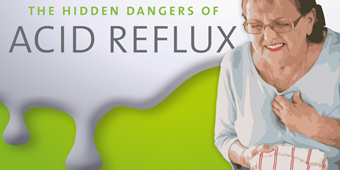Barrett’s Esophagus: What You Need to Know

Answer a few questions and we'll provide you with a list of primary care providers that best fit your needs.
When all is well, your esophagus – which carries food from your throat to your stomach – has a smooth, pale pink lining of cells. But with a condition called Barrett’s esophagus, this lining changes, says gastroenterologist Mustafa Musleh, MD. The esophagus doesn’t like acid, so it develops an extra layer of cells that are more resistant to acid.
Although this added layer of cells may not cause you problems, they have a higher chance of becoming cancerous than normal tissue.
Who Is Likely To Get Barrett’s Esophagus?
Gastroesophageal reflux disease (GERD) is a leading cause of Barrett’s esophagus.
When you have GERD, the acidic contents of your stomach back up into your esophagus. This action is normally prevented by a one-way valve, called the lower esophageal sphincter. But if the valve weakens, reflux and heartburn can result, causing a burning sensation, burping, or sour-tasting fluid in your mouth.
About 10 to 15 percent of people with GERD develop Barrett’s esophagus, says Dr. Musleh. Men are twice as likely as women to develop the condition, especially Caucasian men. The average age at diagnosis is 55.
Your risk of developing Barrett’s esophagus is higher if you currently or have ever smoked and/or are overweight with high levels of belly fat. Some experts also believe that genetics play a role.
What Are the Symptoms And How Is It Diagnosed?
Although you’ll know if you have GERD, there are no symptoms to indicate you’ve developed Barrett’s esophagus. “Most of the time we discover the disease when we’re doing an endoscopy for a different reason,” says Dr. Musleh. It takes an endoscope to see it, and a biopsy to confirm it.
If you have GERD or have been suffering with heartburn or regurgitation for five years or more, ask your doctor about your risk of Barrett’s esophagus. Also tell your doctor if you have difficulty swallowing; unexplained weight loss; black, tarry or bloody stool; or are vomiting blood.
The Risk Of Cancer With Barrett’s Esophagus
If you have Barrett’s esophagus, your risk of developing esophageal cancer is still low – about one in 200. “It’s not a reason to panic,” says Dr. Musleh, “but it does increase the risk of cancer.”
The disease progresses in stages. “If the lining of your esophagus shows just a slight change, we call this low-grade dysplasia, a pre-cancerous condition,” says Dr. Musleh. “If the cells in the lining of your esophagus have become abnormal, we call this high-grade dysplasia, which is more concerning.” High-grade dysplasia is linked to the highest risk of cancer.
If you have dysplasia, your doctor may recommend more frequent upper endoscopy exams or endoscopic procedures to destroy the precancerous cells.
Who Needs Treatment And What Are the Options?
Gastroenterologists and other medical providers typically treat the symptoms of GERD to stop the progression of Barrett’s esophagus. Common medications are antacids, histamine receptor antagonists, and proton pump inhibitors (such as Nexium, Prevacid, Prilosec, and Protonix).
Other treatments include:
- Regular endoscopy exams. Your doctor may recommend annual (or more frequent) endoscopy exams to monitor precancerous tissue.
- Radiofrequency ablation. This involves application of heat from radio waves, through an endoscope, to kill abnormal cells and allow normal cells to replace them.
- Photodynamic therapy. A light-activated chemical is injected into a vein in your arm 24 to 72 hours before this treatment. During the procedure, your doctor will use an endoscope with a laser attached to kill precancerous cells in your esophagus.
- Surgery. If you have high-grade dysplasia, the stage that develops just before esophageal cancer, a surgeon may remove the abnormal part of the esophagus. This procedure is called an esophagectomy.
The best ways to prevent Barrett’s esophagus are to manage GERD, maintain a healthy weight, and don’t smoke.
Answer a few questions and we'll provide you with a list of primary care providers that best fit your needs.
Source: American Society for Gastrointestinal Endoscopy; American College of Gastroenterology; National Institute of Diabetes and Digestive and Kidney Diseases; Mustafa Musleh, MD, Digestive Specialists, Inc.





